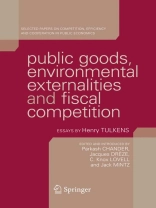Over the last forty years, the field of public economics has emerged as a modern successor to public finance. It has gained importance on the research agenda of economists and in the curricula of economics depa- ments. It has become a diversified field, rich in theoretical developments and substantive applications. Beyond the traditional concerns with t- ation or public goods, a number of new concerns have entered the scene, concerning for instance public sector pricing, the management of public firms, social security or federalism. A comprehensive presentation of the field extends nowadays beyond the scope of textbooks and requires access to a growing specialised literature. The present volume, collecting 22 papers published by Henry Tulkens over the period 1978–2003, is offered as an illustration of these new developments. The illustration has three dimensions: approach, s- ject matters and methods. Coming from a single author, admittedly assisted by 18 co-authors, the different papers are illustrative of an underlying general approach, which I like to label ‘‘operational public economics’’. With these simple words, I mean an approach under which issues in public economics are formulated so as to capture essential elements of actual situations. Ty- cally, this leads to theoretical models more complex than standard te- book formulations. It is then up to the public economist to extend the theory as needed to fit the situation.
Зміст
Decentralised Resource Allocation Processes for Public and Private Goods.- Dynamic Processes for Public Goods: An Institution-Oriented Survey.- Surplus-Sharing Local Games in Dynamic Exchange Processes.- Exchange Processes, the Core and Competitive Allocations.- Commodity Exchanges as Gradient Processes.- Environment, Public Goods and Externalities.- An Economic Model of International Negotiations Relating to Transfrontier Pollution.- Theoretical Foundations of Negotiations and Cost Sharing in Transfrontier Pollution Problems.- The Acid Rain Game as a Resource Allocation Process, with Application to Negotiations Between Finland, Russia and Estonia.- The Core of an Economy with Multilateral Environmental Externalities.- A Core-Theoretic Solution for the Design of Cooperative Agreements on Transfrontier Pollution.- The Kyoto Protocol: An Economic and Game Theoretic Interpretation.- Simulating Coalitionally Stable Burden Sharing Agreements for the Climate Change Problem.- Transfers to Sustain Dynamic Core-Theoretic Cooperation in International Stock Pollutant Control.- Efficiency Analysis.- Measuring Labor-Efficiency in Post Offices.- On FDH Efficiency Analysis: Some Methodological Issues and Applications to Retail Banking, Courts and Urban Transit.- Assessing and Explaining the Performance of Public Enterprises: Some Recent Evidence from the Productive Efficiency Viewpoint.- Non-Frontier Measures of Efficiency, Progress and Regress for Time Series Data.- Nonparametric Efficiency, Progress and Regress Measures For Panel Data: Methodological Aspects.- Efficiency Dominance Analysis (EDA): Basic Methodology.- Fiscal Competition And Optimality.- Commodity Tax Competition Between Member States of a Federation: Equilibrium and Efficiency.- On Pareto Improving Commodity Tax Changes Under Fiscal Competition.- Optimality Properties of Alternative Systems of Taxation of Foreign Capital Income.- Tax Interaction Dynamics Among Belgian Municipalities 1984-1997.












